Did the Pandemic Help Sale Bio-Threat and Multiplayer Games?
- March 15, 2020
- Michał Dębek
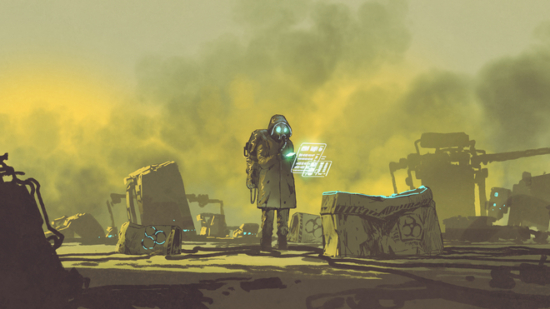
Among the thousands of games available on Steam, there are at least a dozen titles centered around viral outbreaks, pandemics, bioterrorism, and other bio-threats. With the ongoing global health crisis, one might wonder: are these games seeing a surge in popularity? Is there a particular type of game that resonates more with players who are staying at home during the pandemic? To answer these questions, we decided to take a closer look and investigate.
How the Pandemic Might Shift What Games We’re Into
We developed two hypotheses regarding the impact of the COVID-19 pandemic on players’ interest in pandemic-themed games.
First Hypothesis: Interest in Plague-Centered Games
We speculated that the recent coronavirus outbreak, along with the growing reality of living through a global pandemic in Europe, would influence interest in games centered around similar themes. However, we were uncertain about the exact nature of this impact, as it could manifest in opposing ways depending on coping styles people adopt when facing stress.
One well-known framework is Lazarus and Lazarus and Folkman’s Stress and Coping theory. It divides coping mechanisms into problem-focused and emotion-focused strategies. These represent two distinct approaches to managing psychological distress. We believe these coping styles could shape people’s attitudes toward video games centered on plagues and similar themes.
Problem-Focused Coping
Emotion-Focused Coping
Monitoring
Monitoring refers to the tendency of individuals to actively seek information about a stressor, increasing their awareness and understanding of the situation. This approach is often linked to a proactive attitude, where people gather relevant information, assess risks, and prepare for potential outcomes.
Blunting
In contrast, blunting is characterized by avoidance and distraction. Individuals with a blunting coping style tend to minimize their engagement with the stressor, often using strategies like denial, distraction, or emotional numbing. This helps reduce their emotional response to the situation. Blunting can be adaptive when the stressor feels uncontrollable or overwhelming, allowing individuals to maintain emotional stability despite the stress.
In the context of the pandemic, people with a blunting coping style may avoid acknowledging the issue, deny its existence, and try to carry on as if it doesn’t affect them. As a result, they might choose activities that offer a mental escape from reality and steer clear of games with such themes to maintain their psychological well-being.

These coping styles can vary depending on the individual tendencies, the context and the stressor. Additionally, individuals may shift between monitoring and blunting based on their perception of the situation’s controllability. As a result, predicting whether there would be a surge in the popularity of plague-themed games or a decline is not straightforward.
Ultimately, we formulated a two-tailed, non-directional hypothesis. We believed that the sales of pandemic-themed games since the outbreak of widespread interest in coronavirus (as shown in the chart below) would differ significantly from sales during the same period in 2019.

Second Hypothesis: Interest in Community-Centered Games
Secondly, we hypothesized that as social isolation—whether compulsory or voluntary—increased, the popularity of “community-based” games, particularly multiplayer games, would rise.
Psychologically, humans have an innate need for social connection and it is essential for psychological well-being. Our evolutionary history has shaped a deep-seated desire to be part of a group, as these connections provide a sense of security and belonging. This “need to belong” is a fundamental human motivation. People are driven to form and maintain strong interpersonal relationships.
This need is further supported by findings that demonstrate the detrimental effects of social isolation, which can lead to increased rates of depression, anxiety, and even mortality.
In times of social isolation, this need to belong doesn’t disappear; rather, it may drive people to seek alternative ways to fulfill it.
With traditional social interactions limited, we speculated that players would turn to virtual environments to engage with others.
Multiplayer games, which offer opportunities for socializing, teamwork, and shared experiences, could act as substitutes for real-world interactions.
We believed this shift in behavior would be evident in players’ purchasing habits, as they sought to maintain social connections in the face of isolation.
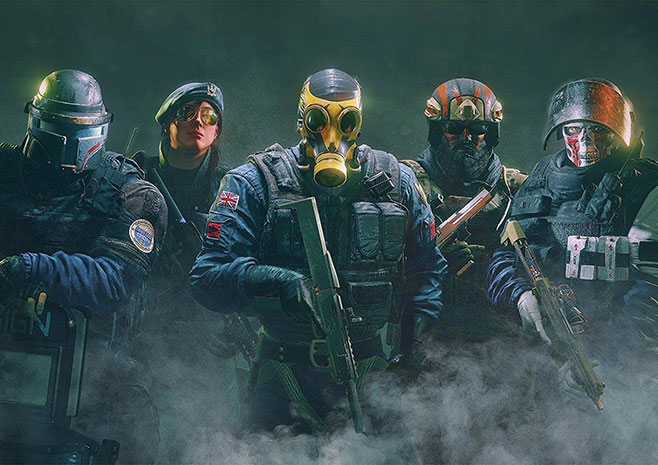
How We Collected the Data
We used publicly available data from Steam Spy, a tool that tracks video game sales on Steam, the largest digital distribution platform for PC games. Steam boasts over 120 million active users every month, with 62 million logging in daily. The platform generates over four billion dollars in annual sales, making it the primary revenue source for PC game publishers. While there are no other major distribution alternatives except for direct sales through developers’ websites, the data provided by Steam Spy, although not perfectly accurate due to its reliance on complex statistical models rather than direct sales figures, still offers a reliable snapshot of the PC gaming market.
How We Chose the Pandemic-Themed Games
From the wide array of video games centered on various bio-threats, we selected seven titles released over the past decade. When players search for games on a specific topic—rather than simply opting for the newest or most heavily promoted—they are likely to gravitate toward well-reviewed options. For this reason, we chose to include only games with an average Metacritic score of 75% or higher. This approach allowed us to focus on titles ranging from solid to exceptional quality. The selected games, listed alphabetically, are:
- A Plague Tale: Innocence (Asobo Studio)
- Pandemic: The Board Game (Z-Man Games)
- Plague Inc: Evolved (Ndemic Creations)
- Resident Evil 2 / Biohazard RE: 2 (Capcom)
- Sunset Overdrive (Insomniac Games)
- Tom Clancy’s The Division (Massive Entertainment)
- Unforeseen Incidents (Backwoods Entertainment)
Although there are additional titles related to the topic of interest, not all of them are available on Steam.
How We Chose Our Game Comparisons
First, we analyzed the sales growth of all games available on Steam and compared it to the sales of bio-threat-themed games. Next, we shifted our focus to categories that were largely unrelated to epidemic themes, such as:
- sports games (sports),
- racing games (racing)
- sailing (sailing),
- fighting games (fighting)
- strategy games (strategy)
- team-based (a category used to test the second hypothesis regarding the tendency of individuals to counteract social isolation through increased virtual interaction).
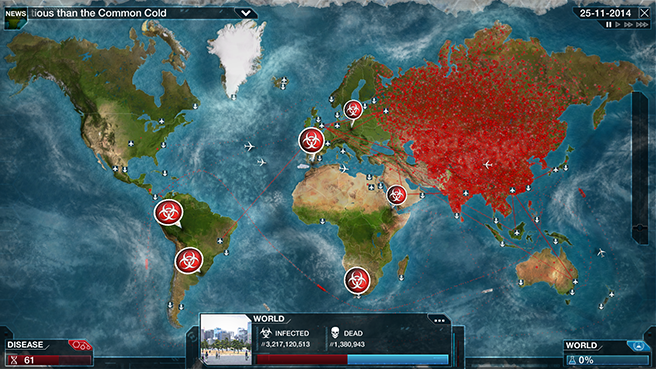
We analyzed several thousand games with varying levels of quality, sales figures, and release dates. The comparison included both indie games and major AAA titles from well-known developers and publishers.
Did the Pandemic Help Sale Bio-Threat Games?
Definitely not. In fact,
from February 1 to March 13, 2020, epidemic-themed games sold 30% worse than during the same period in 2019, when players hadn’t even heard of the Wuhan outbreak.
Sales growth during the “epidemic period” was 6 percentage points lower compared to the previous year. On average, there were about 30,000 fewer game sales per epidemic-themed title in early 2020 than in 2019.
Of course, there were a few titles that performed well during this period, such as Sunset Overdrive and Plague Inc. Evolved. However, overall, the period from February to March 2020 wasn’t a great time for games centered around epidemics.

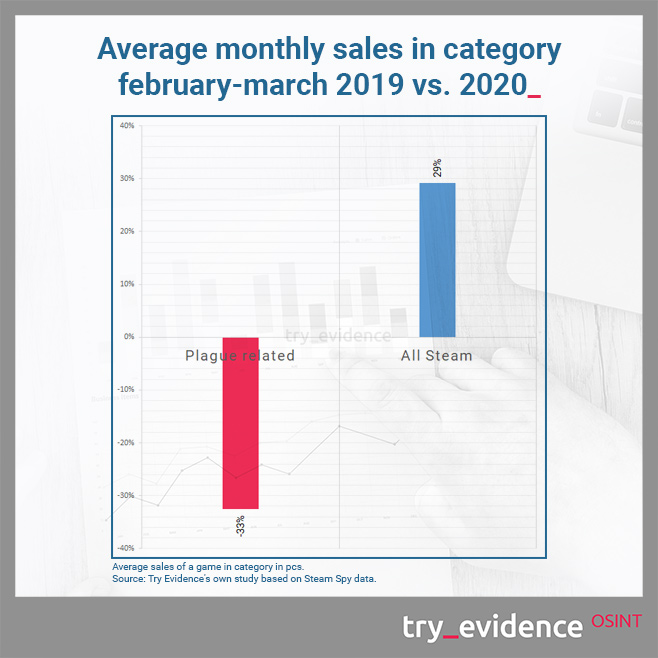
The decline in sales for bio-threat games could possibly be attributed to the majority of people adopting the blunting strategy of emotional coping. It involves avoiding distressing topics and seeking distractions to reduce emotional discomfort. Players might have been more likely to avoid content that reminded them of the real-world crisis. However, we cannot rule out other potential factors that could have influenced this trend, and it’s important to consider the complexity of player behavior and the broader context during that period.
Did the Pandemic Help Sale Team-Based Games?
It seems so, assuming Steam Spy’s algorithms are accurate. Team-based games like Peekaboo (Redaster Studio), H-Hour: World’s Elite (SOF Studios), and Blacklist Brigade (Goat Forest Games) saw sales growth of several hundred percent in February and March 2020.
Meanwhile, the more established multiplayer team-based titles, such as Left 4 Dead (Turtle Rock Studios), Tom Clancy’s Rainbow Six: Siege (Ubisoft Montréal), and PayDay: The Heist (Overkill Software), experienced a more modest increase in sales.
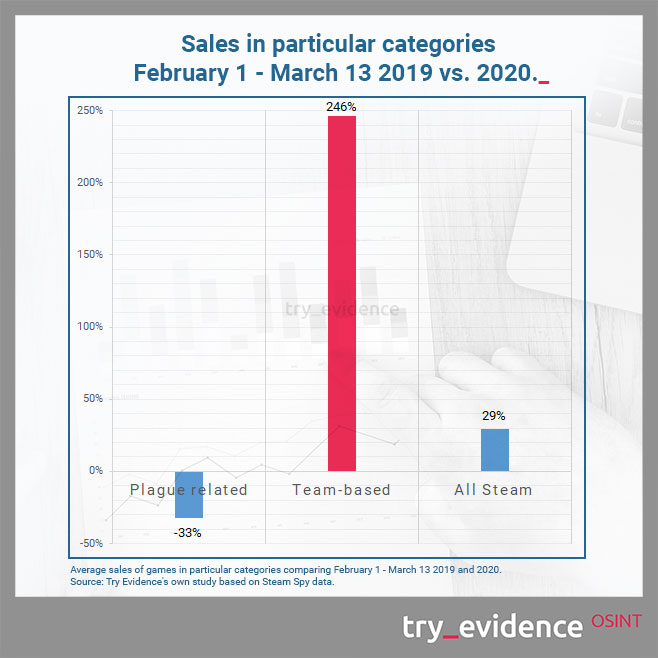
Summary
It seems that players are growing tired of the constant reminders of the pandemic—coronavirus, quarantine, and state of emergency. As the pandemic continues to shape daily life, players appear to be distancing themselves from games that reflect the crisis. Perhaps it’s a way of coping with the overwhelming stress and constant reminders of the global situation. The psychological need for escape from the unsettling realities of quarantine, lockdowns, and health emergencies seems to be influencing gaming preferences. While at home, people are not just looking to rest physically, but to escape the dark, apocalyptic images pushed by the media.
During the Black Death in the 14th century, people huddled together in their homes and shared stories—some lighthearted, some moralizing—like those found in Boccaccio’s The Decameron. Similarly, today’s players are gravitating towards team-based, sports, and fighting games that offer both a distraction from fear and an opportunity for social connection. These genres not only allow players to engage with others—whether through direct interaction or online play—but also fulfill the deep-seated need for social belonging.
This behavior may reflect a psychological tendency. During such crises, people often turn to connections—whether physical or virtual—for comfort and reassurance. These connections offer a sense of security, which feels more comforting than confronting uncontrollable, anxiety-inducing situations.






